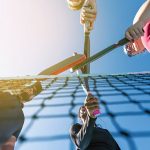The Nike Foundation will help fund the Adolescent Girls Initiative, a public-private partnership between the World Bank, the country of Liberia and the Nike Foundation. Launched at the World Bank on Oct. 10, the program aims to increase economic opportunities for adolescent girls as part of the effort to reconstruct Liberia after 14 years of war.
In a statement, Nike Foundation said the program targets girls specifically because of the girl effect-the ability of adolescent girls in developing countries to bring unprecedented economic and social change to their families, communities and countries. For example, research has shown that girls and women will reinvest 90% of their income back into their families, as compared to 35-40% for males. Because girls are central to the intergenerational transfer of wealth the collaboration intends to focus on programs and services designed specifically for them.
“We are thrilled to have the support of the World Bank, Denmark and the Nike Foundation and expect this collaboration to serve as a model for Africa and the world. As powerful economic actors, girls represent our nations future; this partnership is essential to Liberias post-conflict recovery,” said president Ellen Johnson-Sirleaf of Liberia,
The Adolescent Girls Initiative will identify employment needs in Liberia, and provide relevant skills training to adolescent girls, matched to paying jobs. The training offered to girls aged between 16 and 24 will focus on technical skills, as well as the integration of life-skills training to address some of the crucial barriers to the development of adolescent girls economic independence. Employment in high-growth and high-need sectors, such as agriculture, entrepreneurship, emerging industries, urban services, infrastructure, public works and health care, is a major focus. Initially designed to reach 1,500 adolescent girls and young women, the partners aim to see the work brought to scale in Liberia and replicated in other developing countries.
“Theres a strong argument for investing in girls. Economic opportunity-particularly that of adolescent girls-is crucial to generating the incentives that reverse inequality and break intergenerational cycles of poverty,” said World Bank Managing Director Ngozi Okonjo-Iweala. “By working in partnership, we can make great strides in improving the livelihoods of adolescent girls, their families and communities-in Liberia and elsewhere.”
“Our partners in this initiative are pioneers. They are among the leading organizations who recognize adolescent girls potential to impact entire nations,” said Maria Eitel, president of the Nike Foundation. “Much like microfinance practitioners did decades ago when proving the credit-worthiness of the poor, we intend to demonstrate an irrational gap in the market that severely undervalues adolescent girls economic potential. It will be girls who rebuild a nation.”















